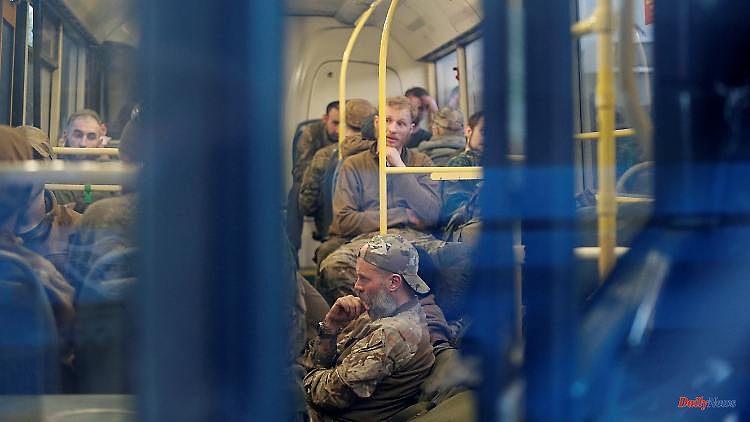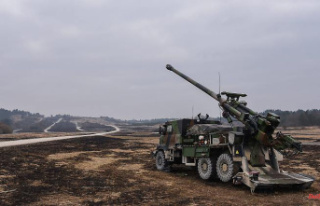They defended the last bastion of Mariupol. Now the fate of more than 260 Azovstal fighters is in Russian hands. You could even face the death penalty. Moscow claims to have destroyed important infrastructure in eastern Ukraine and says more than 470 Ukrainian fighters have been killed in the last 24 hours. Meanwhile, Finland and Sweden want to jointly apply for NATO membership. In a possible oil embargo, Putin sees the main damage to the EU alone. The 83rd day of the war at a glance.
Mariupol's last defenders in Russian captivity
With the capture of numerous Ukrainian soldiers, the fighting for the besieged steelworks in Mariupol has come to an end. "In the past 24 hours, 265 fighters, including 51 seriously wounded, have laid down their arms and taken captive," said Defense Ministry spokesman Igor Konashenkov. Kyiv, on the other hand, speaks of 264 soldiers who are said to have been taken to the town of Olenivka, which was occupied by Russian troops. There is no information on whereabouts from Russia. What happens to them now remains unclear. Kyiv is banking on an exchange for Russian prisoners of war, but Moscow has not yet confirmed this. Contrary to all assurances from Moscow that the detainees are treated well and receive medical care, some observers fear that they could now become victims of ill-treatment and torture. It also remains to be seen what will happen to the soldiers who remained at the plant.
Russian negotiator denies Azovstal fighters right to life
According to a Russian negotiator, the Ukrainian fighters of the Azov regiment have no right to life. Russia should consider the death penalty for these nationalist militants, said Leonid Slutsky, who is negotiating with Ukraine on Russia's behalf. "They do not deserve to live in the face of the monstrous human rights crimes they have committed and continue to commit against our prisoners." Slutsky, who is also the chairman of the Duma's foreign affairs committee, called the soldiers "animals in human form". According to the chairman of the Russian lower house, Vyacheslav Volodin, a prisoner exchange is also out of the question for "Nazi criminals". He made no explicit reference to the defenders of the Azov Steelworks, but Moscow had repeatedly referred to the Azov regiment fighting there as "Nazis." Russia repeatedly uses the Azov National Guard Regiment, in which right-wing extremists also fight, as justification for the war against Ukraine, which aims at the supposedly necessary "denazification" of the neighboring country.
According to a media report, the Azovstal fighters in captivity are being questioned by a Russian investigative committee. This is part of the investigation into "criminal cases related to crimes committed by the Ukrainian regime," reports the TASS news agency, citing the committee.
World Criminal Court sends largest team of investigators to Ukraine
Russia is also under investigation for possible war crimes. The International Criminal Court has sent a team of 42 experts to the country for this purpose. It is the largest investigative team that the International Criminal Court has ever sent, as chief prosecutor Karim Khan said in The Hague. The team included investigators and forensic experts.
Russia reports numerous rocket attacks in the west, north and east
Meanwhile, the Russian military announced several rocket attacks on different parts of Ukraine. In the western Ukrainian region of Lviv, Kalibr missiles were used to attack Ukrainian reservists and foreign military equipment, says Defense Ministry spokesman Igor Konashenkov. In the northern Ukrainian region of Chernihiv, among other things, military training centers were attacked. In the east of the country, parts of the railway infrastructure were destroyed in the Kharkiv region and several targets were fired at with rockets in the Donetsk region. In total, more than 470 Ukrainian fighters have been killed in the past 24 hours, says Konashenkov. The information cannot be independently verified.
Ukraine receives German anti-tank weapons - Zelenskyj says thank you
According to a report, Germany has delivered more weapons to Ukraine. In the past two weeks, 2,450 RGW 90 anti-tank handguns, also known as "Matador", 1,600 DM22 anti-tank directional mines and 3,000 DM31 anti-tank mines have arrived in Ukraine, the "Spiegel" reported. The weapons have already been distributed within the Ukrainian army. Without going into specific arms deliveries, Ukrainian President Volodymyr Zelenskyy thanked Germany for its defense support.
Macron promises Selenskyj significantly more weapons
French President Emmanuel Macron has also promised his Ukrainian counterpart Zelenskyy more weapons. According to a statement from the Elysée Palace, Macron said in a joint telephone conversation today that arms deliveries from Paris would "intensify in the coming days and weeks". At the end of April, Macron promised to deliver Milan anti-tank weapons and Caesar howitzers to Ukraine. According to the statement, Macron also promised Zelenskyj additional humanitarian aid.
British intelligence sees 'indiscriminate' Russian shelling as strategy
According to British findings, the Russian armed forces are increasingly relying on "indiscriminate artillery fire". The Ministry of Defense said in London that Russia has only limited possibilities for capturing targets and is also reluctant to take the risk of deploying combat aircraft over Ukrainian-controlled territory. "In the coming weeks, Russia is likely to continue to rely heavily on massive artillery strikes as it attempts to revive its Donbass offensive." During the unsuccessful attack on Kyiv, around 3,500 buildings were destroyed or damaged in the Chernihiv region in northern Ukraine. Around 80 percent of the destruction affected civilian buildings.
Putin calls EU oil embargo "economic suicide"
Kremlin boss Vladimir Putin has described European energy policy as "economic suicide". "It is obvious that with the departure of Russian energy sources from Europe to other regions of the world, there is also the possibility of an increase in economic activity," said Putin, referring to the debate about an EU oil embargo against Russia. Putin spoke of unthought-out, chaotic moves by some "partners" that Russia must use to its own advantage.
Finland and Sweden want to apply for NATO membership together
In a historic about-face, Sweden and Finland will formally apply for NATO membership tomorrow. Finland's President Sauli Niinistö and Sweden's Prime Minister Magdalena Andersson announced that both countries' applications for membership should be submitted to the alliance together. NATO has given the Nordic countries the prospect of rapid admission - despite a veto threat from member Turkey.
G7 discuss over 15 billion euros in aid payments
The leading Western industrial nations (G7) are also discussing billions in subsidies for Ukraine this week. At the meeting of the G7 finance ministers on the Petersberg near Bonn, they want to initiate budget support for the country shaken by the Russian war, as the German Press Agency learned from those close to the Ministry of Finance. Accordingly, Ukraine has asked for aid of around five billion euros per month for three months. Overall, it is initially about 15 billion euros. After the three months, however, further support may be needed. Ukraine needs the money to pay for pensions and government employees, for example. It is unclear whether the entire amount will be granted as a grant or part as a loan.
Military expert shocked by war criticism on Russia's state TV
A military expert surprised viewers of a talk show on Russian state television with a pessimistic assessment of the war in Ukraine. The Ukrainian armed forces are far from disintegrating and Russia is isolated in the world by the war, Mikhail Khodaryonok said - much to the presenter's apparent displeasure - on a TV show. On the show, the former Russian general staff officer contradicted a number of claims made by Russian state propaganda, which he criticized as "information tranquilizers." The motivation of the Ukrainians to fight for their country is quite high, said Khodaryonok - and thus positioned himself clearly against the claim, often repeated on state television, that many Ukrainians see Russia's "special military operation" as an alleged "liberation".
More articles on the Ukraine war
You can read all further developments in our live ticker on the Ukraine war.
6












